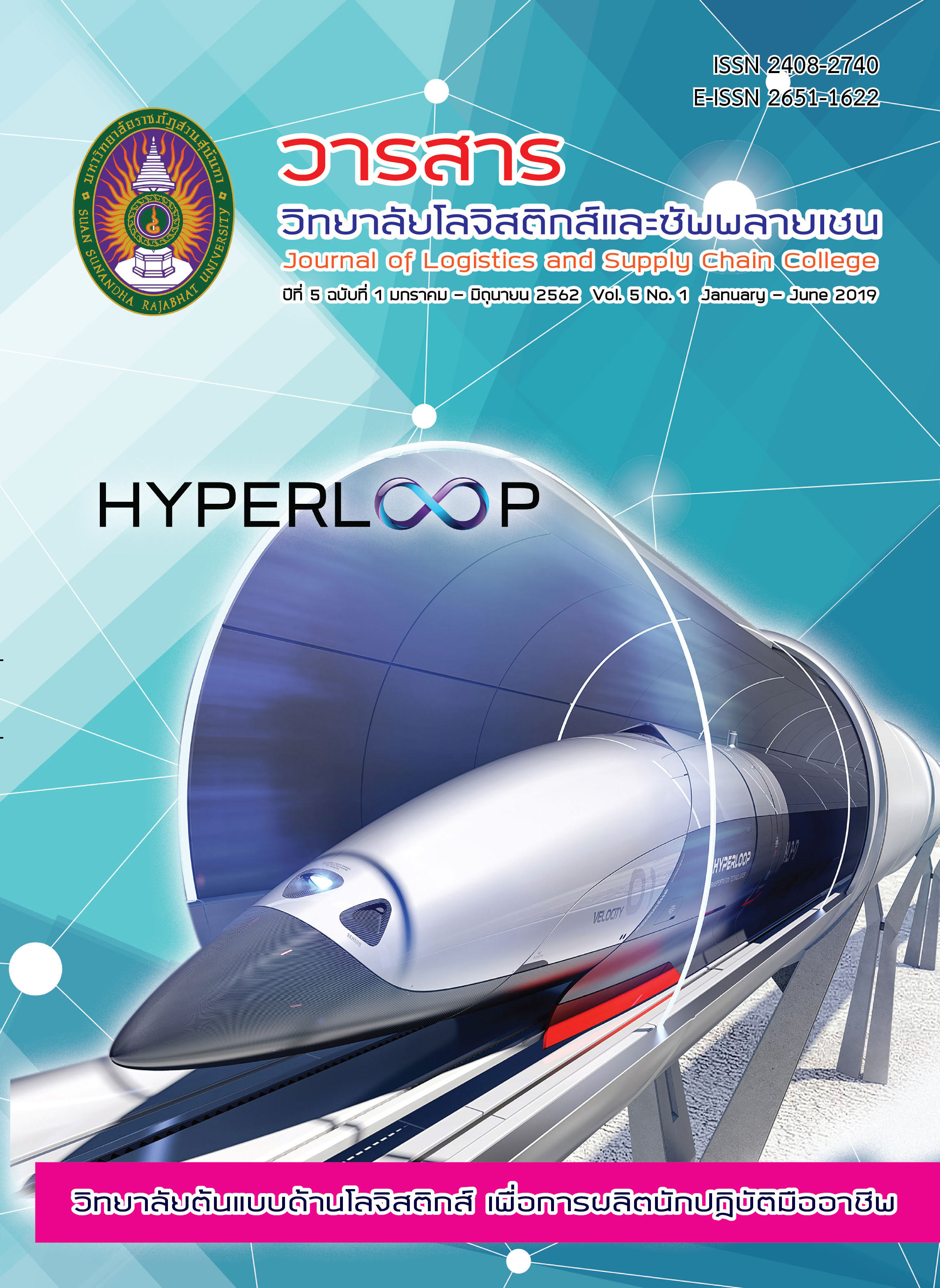Factors Affecting Supply Chain Management of Community Enterprise Riceberry in Nakhon Pathom Province
Abstract
The objectives of this research to analyze the condition of factors affecting supply chain management in the riceberry Community Enterprise in Nakhon Pathom by the SCOR Model Management Process. The research methodology used in this work was qualitative research by analyzing the supply chain management process and the operating conditions of the riceberry Community Enterprise group in Nakhon Pathom with local wisdom and sufficiency economy concepts. The In-Depth Interview was used with Riceberry Community Enterprise Group in Nakhon Pathom Province. The samples consisted of Group president of Community Enterprise Riceberry inNakhon Pathom Province 2 persons, and Group Members of Community Enterprise Riceberry in Nakhon Pathom Province 6 persons, Including 2 experts in supply chain management persons, total of 10 persons. The results found that Factors Affecting Supply Chain Management Guideline of Riceberry Rice Commnity Enterprise to enable community enterprises to be able to carry out agricultural activities with strength and self-reliance, found that in addition to supply chain management, in accordance with the conceptual framework of the SCOR Model, the 6 aspects are (1) Plan (2) Source (3) Make (4) Delivery (5) Return and (6) Enable. Which has strong effect on the ability to operate the business and can be self-reliant. There are other important factors including 1. Management principles 2. Planning 3. Supply Chain Management from upstream to downstream 4.Network construction 5.Create awareness of the benefits of riceberry rice.
References
กรมการข้าว. (2552). การจัดเขตศักยภาพการผลิตข้าว จังหวัดนครปฐม. เอกสารกรมวิชาการ กรมการข้าว.
ดุษฏี นาคเรือง และคณะ. (2560). ปัจจัยที่มีอิทธิพลต่อผลการดำเนินงานของวิสาหกิจชุมชนจังหวัดยะลา.วารสารศรีนครินทรวิโรฒวิจัยและพัฒนา (สาขามนุษย์ศาสตร์และสังคมศาสตร์). 9(17), 69-77
เตชธรรม สังข์คร. (2560). ห่วงโซ่อุปทานเครื่องแกงของกลุ่มวิสาหกิจชุมชนในจังหวัดสุราษฏร์ธานี. RMUTT Global Business and Economics Review, 12(1), 75-88.
ทมนี สุขใส. (2561). การประเมินศักยภาพด้านการจัดการโลจิสติกส์ กรณีศึกษา : บริษัท ABC จำกัด. การประชุมวิชาการและนำเสนอผลงานวิจัยระดับชาติ ครั้งที่ 10 “ถักทองานวิจัยท้องถิ่น ก้าวไกลสู่สากล”.ณ มหาวิทยาลัยราชภัฎนครราชสีมา.
ธนิต โสรัตน์. (2552). การจัดการห่วงโซ่อุปทานในยุคโลกาภิวัฒน์. พิมพ์ครั้งที่ 1. กรุงเทพฯ: วี-เซิร์ฟ โลจิสติกส์.
บุญดิษฐ์ วรินทร์รักษ์ (2550). รูปแบบการผลิตพืชข้าวหอมมะลิไทยไรซ์เบอรี่ กรมการข้าว กระทรวงเกษตรและสหกรณ์ กรุงเทพมหานคร
พัชรินทร์ สุภาพันธ์ และคณะ. (2561). การจัดการห่วงโซ่อุปทานด้ายตัวแบบ SCOR ของผักสดที่ผ่านมาตรฐานการรองรับตามการผลิตทางการเกษตรดี ที่เหมาะสมในจังหวัดเชียงใหม่. วารสารปาริชาติ มหาวิทยาลัยทักษิณ. 31(1), 95-118
วารุณี มิลินทปัญญา. (2553). แนวคิดการวัดสมรรถนะโซ่อุปทานโดยตัวแบบ SCOR Model. สาขาการจัดการโลจิสติกส์ คณะบริหารธุรกิจ มหาวิทยาลัยธนบุรี, 4(7), 27-33
เสาวนิตย์ จันทนโรจน์. (2552). การประยุกต์แบบจำลองโซ่อุปทานเพื่อการประเมินสมรรถนะของโซ่อุปทานในอุตสาหกรรมเม็ดพลาสติกรีไซเคิล: กรณีศึกษา โรงงานผลิตเม็ดพลาสติกรีไซเคิล. มหาวิทยาลัยหอการค้าไทย.
สำนักโลจิสติกส์ กรมอุตสาหกรรมพื้นฐานและการเหมืองแร่. (2559). ความสำคัญของการจัดการโลจิสติกส์และโซ่อุปทาน. ผู้แต่ง



